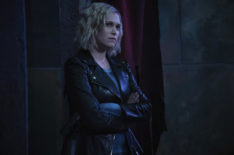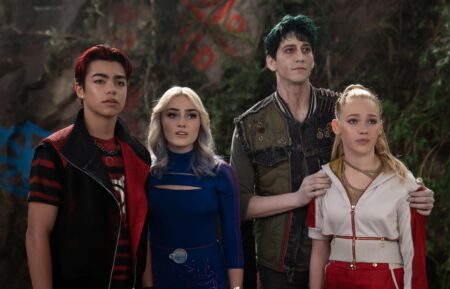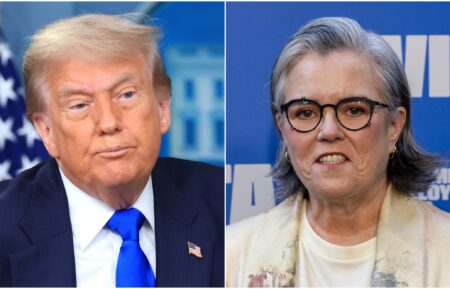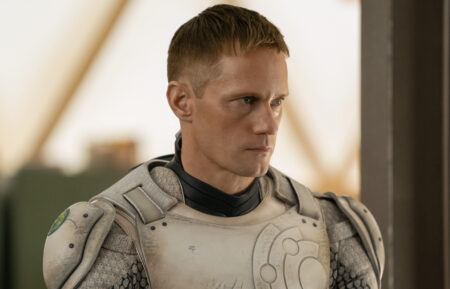‘The 100’ Boss Breaks Down the Series Finale & Those 2 Big Returns
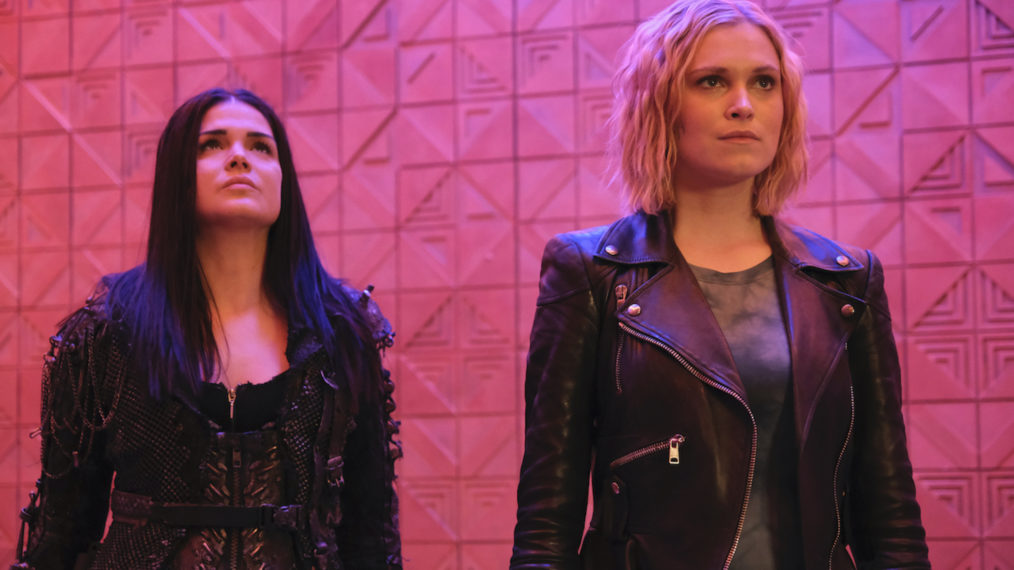
Spoiler Alert
Well, after seven seasons, multiple apocalypses (apocalii?) and countless character deaths, The 100 is done.
It’s been a wild ride, heartbreaking at times, horrifying for myriad reasons (and not just because of what was on screen) and some kind of wonderful to see how invested viewers could be in a show. With one of the most verbal and active fandoms, we can only imagine what the reactions are online right now.
Instead of wading into that battleground, we would simply like to offer showrunner Jason Rothenberg’s take on “The Last War,” what it all meant, what he hopes we took from it… and what he literally took from the set.
It’s all over!
Jason Rothenberg: I know. And you’ve been there with us from the beginning.
True. And given how many battles you’ve faced over this show, it’s fitting the finale is called “The Last War.”
We really have, you’ve shed some blood, too.
Mostly on Twitter. But to see some familiar faces that have been part of that bloodshed throughout the run was so nice. First, it’s such a beautiful ending. It’s such a hopeful one…
Obviously for seven years we’ve been making a show that was saying one way or another, that tribalism is bad. And that as long as we perpetuate this cycle of violence against the other, whether it’s another country or another group of people or whatever the case may be, then we’re doomed.
And until that stops, it’s fairly simplistic really. Until we stop it, until we realize that we’re all in this together, we are doomed. And so that was kind of the landing point that we were going for with this finale. When they put down their weapons and choose not to fight.
At the end on that beach, we only had four characters that we started with. So many others were introduced as an enemy who then became part of the family.
Yeah, that’s true. It’s been a long and winding road, for sure.
So when you sat down to write this and I mean, how long had you known this is how you wanted to end this?
Wow, that’s a really good question. I feel like I had a sense of it that was in my options there for a while. There were some darker endings that were discussed and ultimately, I knew that I wanted the show to face something that was a little bit more optimistic. Probably around the time that we were begging them to let us end it so that we could write to a certain moral of the story is when it started to take shape.
What can you tell me as far as those possible darker endings that you were thinking about?
You know, I mean, nothing really was ever seriously considered. There were some times in the room where we talked about killing everybody, somehow sacrificially for the human race. Killing everybody we care about. Ultimately though, I feel like the show was always really, really dark and I definitely wanted to have it end— whether hopeful is the right word for it—but definitely on a lighter note.
Well, the hope that I was left with was for these characters choosing each other.
Oh yeah. I mean, they loved each other so much that they chose to forego transcending. In the show we say that it is some version of your energy or your consciousness joining the universal consciousness, which is the next evolution of who we are. They forego that to be together in mortal form on this planet. So Clarke (Eliza Taylor) wouldn’t be alone and so they can be together. They’re a found family, but they’re not transcending at the end, they are not able to reproduce. So, they are the end of the human race.
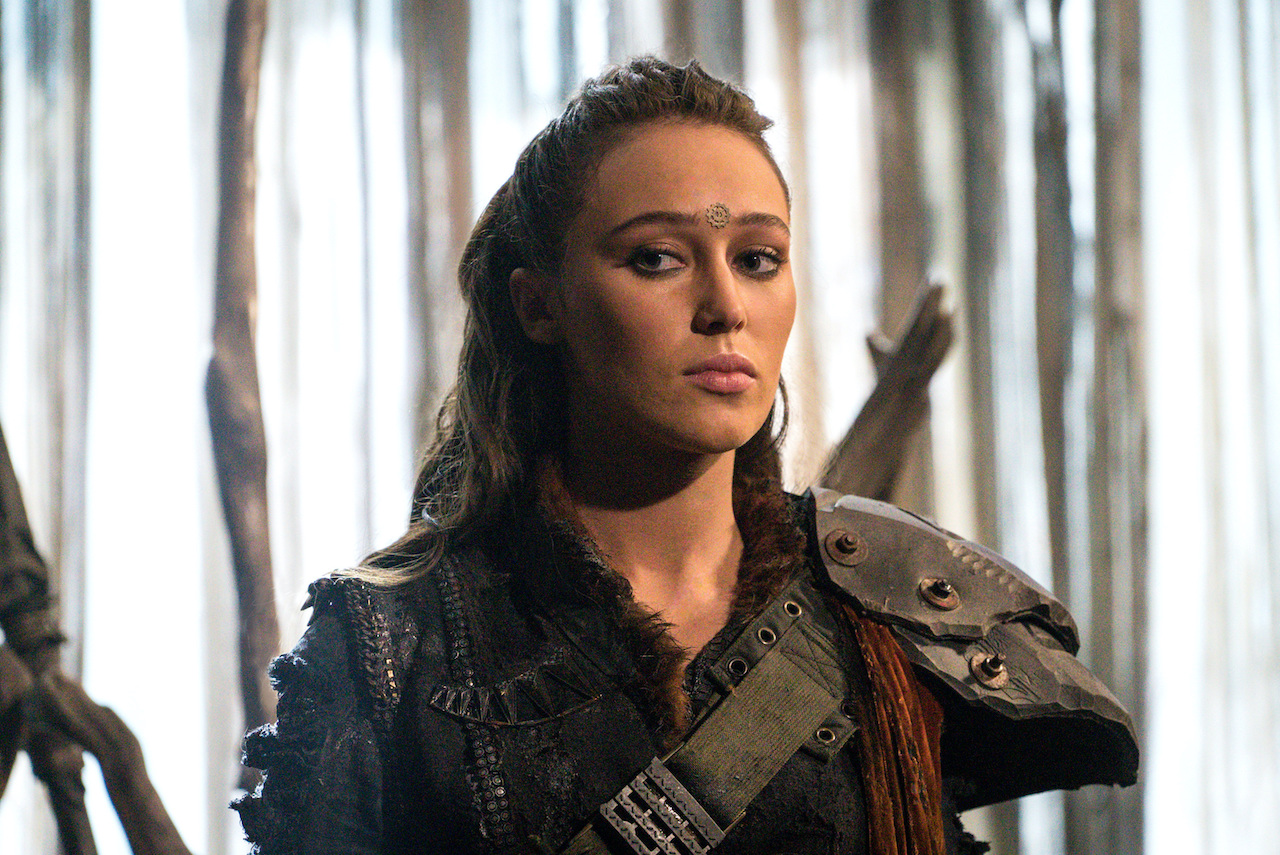
(Liane Hentscher/The CW)
And in bringing this to a close, you were able to get back several important characters…but in classic Jason Rothenberg fashion, you give the fans what they want, but not what they want.
Well, it was really important to Alycia Debnam-Carey to be able to come back and provide a little bit of closure. She and I had lots of conversations about it, what it meant, and what her role would be. And no, she’s not Lexa and of course there will be people that probably are not overly satisfied by it. But it was an amazing thing that she did for us and it was really fun to be able to direct to that.
How does it feel now?
It felt like closure for us for sure. Whether the audience reacts the same way or not, I think some will and some won’t and obviously that’s everybody’s prerogative.
In the Bardoans’ “test” sequences, you introduced the idea of people seeing characters who were their greatest teachers which gave us one more scene between Lindsey Morgan and Paige Turco. This was always one of my favorite relationships.
Yeah, me too. Definitely, getting Paige to come back for the episode was really important to me, also. It’s a little funny that it wasn’t with Clarke of course, but you’re right that it was a very, very pivotal relationship for Raven, as well and I think Abby, too.
And then there is Marie Avgeropoulos, who is always so good. Loved Octavia’s “West Side Story” moment.
Explain the reference a little bit further?
At the end of “West Side Story,” Maria stops the Jets and Sharks from fighting after Tony is killed. She says “How many bullets are left? Enough for YOU? Or YOU? All of you!”
I’m with you there, totally. And that’s what she’s saying. I mean, she literally says, “If I kill you, I kill myself.” So she’s making that plea to both sides to lower your weapons and realize that we are all part of the same human race…she is encapsulating the entire moral of the story. Octavia got it a little while ago. She’s been through a lot so, I feel like she was the logical choice in that moment to step forward and sort of renounce the violence.
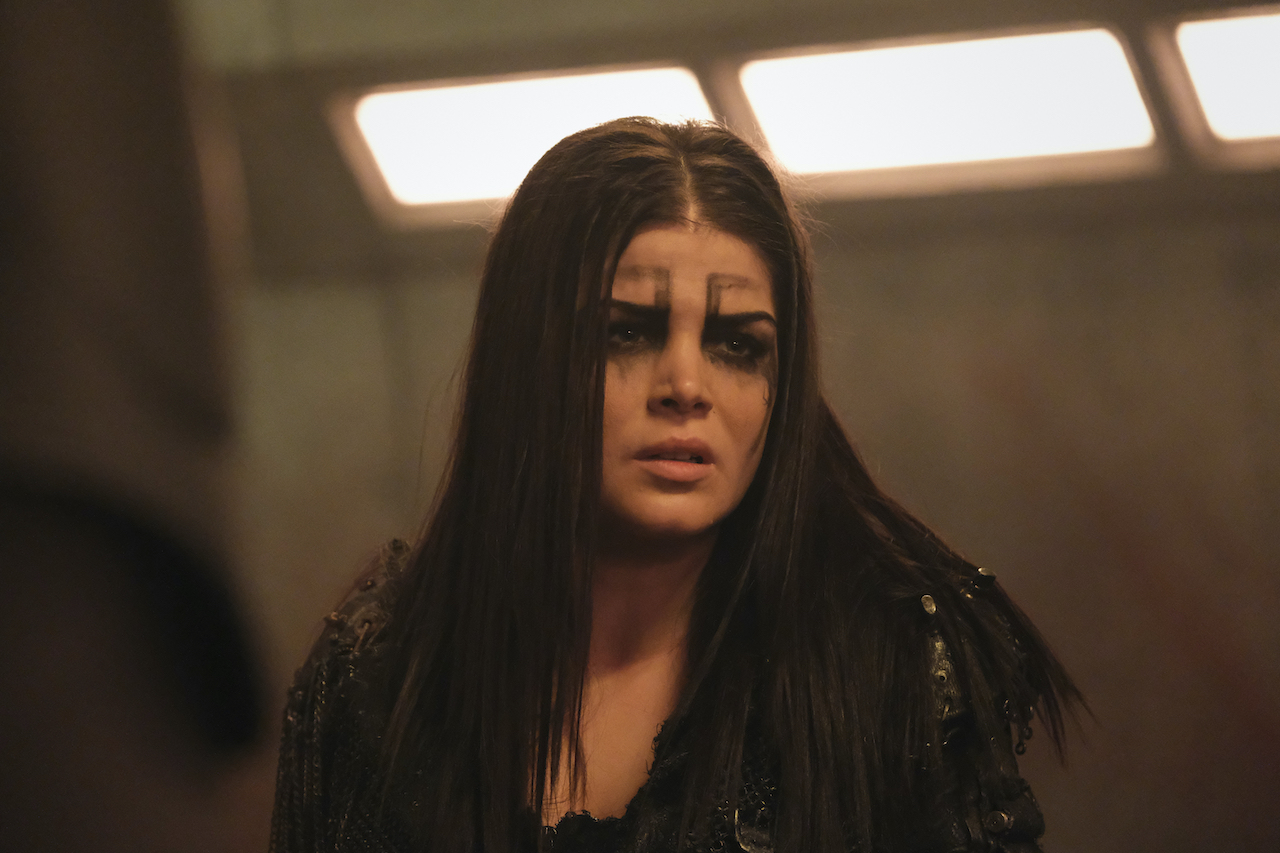
(Bettina Strauss/The CW)
Nice touch, having her suit back up in her old armor basically.
And it’s Levitt (Jason Diaz) who was giving her the makeup that he saw in MCAP, so that was Lincoln’s tattoo.
Nice. What else did you bury into the finale?
I feel like there’s a lot of little callback moments that I’m sure all of the diehard hardcore fans are going to see and appreciate. That is definitely one of them. That was something Marie really wanted to do. On the day we were shooting on the battlefield, I got a call from the makeup trailer that she really wanted to do that and I just said okay because when you’re directing there’s a million things coming at you at once…and there are certainly a million things in the battlefield. So I said yes and then afterwards, I realized, “Oh shit, how do I justify that?” and then I wrote in that idea. Actually, I don’t even think I wrote it, I just did it on that day with Levitt putting it on her face.
You directed this final episode, your first time out there and you get to do everything. Big effects, you get fight sequences, you get the battleground, you get all of the things that people have loved about The 100 and at the time, you were racing to beat the lockdown.
First of all, I have to say that as a first-time director, this is the way to do it: Where you’re directing your own show with people who you love that have worked with you for seven years, that are delivering for you and for each other…I don’t know if I’ll ever have the experience again in that way. Everybody knows their role inside and out and so I was really protected in a lot of ways. I had my longtime employee and friend Ian Samoil, who is a director in his own right—he directed five episodes—and was really holding my hand at certain times when I needed him. [EP and writer] Kim Shumway was on set, even though she didn’t need to be, for support and would tell me if I was getting it right or getting it wrong. So it was really, it was fun in that way.
COVID was approaching, but we didn’t realize it until I think there were three days left…that’s when we got the call that we were shutting down and I had to make a decision. I was given the choice to either shut down instantly or we could finish if we figured out a way to finish in advance. And we did. We shot two days instead of three. We pulled up a lot of themes and shot on Saturday to get it done. I think we might’ve been the last show shooting.
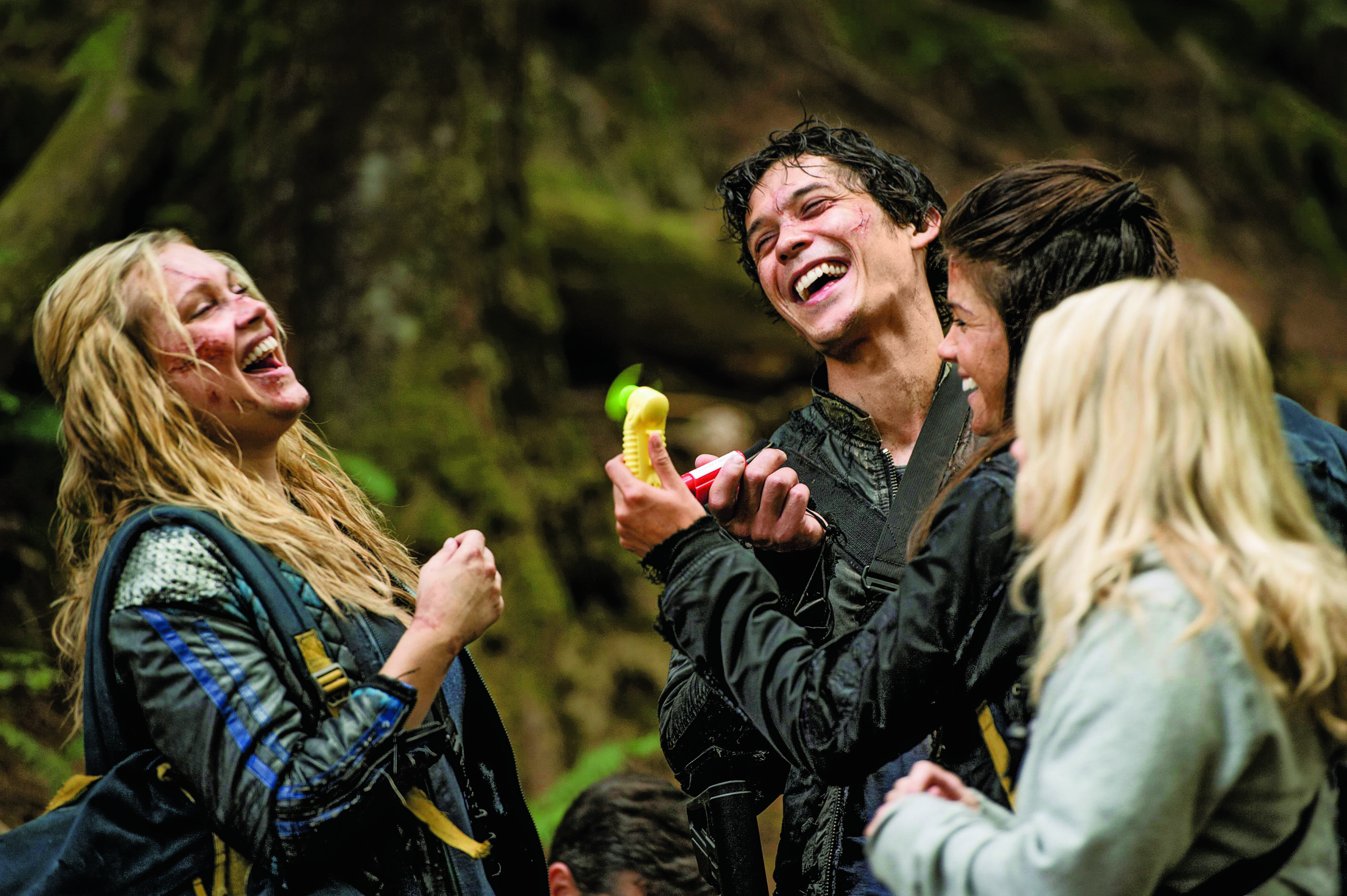
Eliza Taylor, Bob Morley and Marie Avgeropoulos back in the early days of The 100 (The CW)
You wrapped this six months ago, seven months ago. How is it now preparing to say goodbye to it after so long?
It’s been bittersweet. It’s definitely weird because for me because shooting finished shooting in March and we didn’t finish [editing] the whole season until probably June, so it’s been three months since I’ve been done working on the show.
People grew up watching the show, actors found careers, I grew up on the show in the sense of being a showrunner—I wasn’t a showrunner seven years ago when I got the opportunity. I know that there are kids out there that were 12 when they started watching it and they’re graduating college now. My own children, my daughter was three when we started this, my son was 12 when we started this. It’s definitely the end of an era but the show is going to always exist. Thankfully we live in a streaming world now where people can always find it and discover it and thank God for that.
There was so much heat that came down on you for the various deaths. Who was your hardest kill, who was the hardest to say goodbye to?
The hardest to say goodbye to? They’re all really hard to say goodbye to, I have to say. Over the course of the seven years, some were easier than others in the sense of actors that wanted or had to leave for various reasons or new roles. Those are always easier to do because you’re not ending a person’s job. These people are family and they’re friends, so when I kill a character, that’s taking a friend away from these actors who are living in Vancouver together, that’s hard on all of us. I’m sorry if the answer is not more definitive. I usually say, “The answer to that will be the most recent one.” [Laughs]
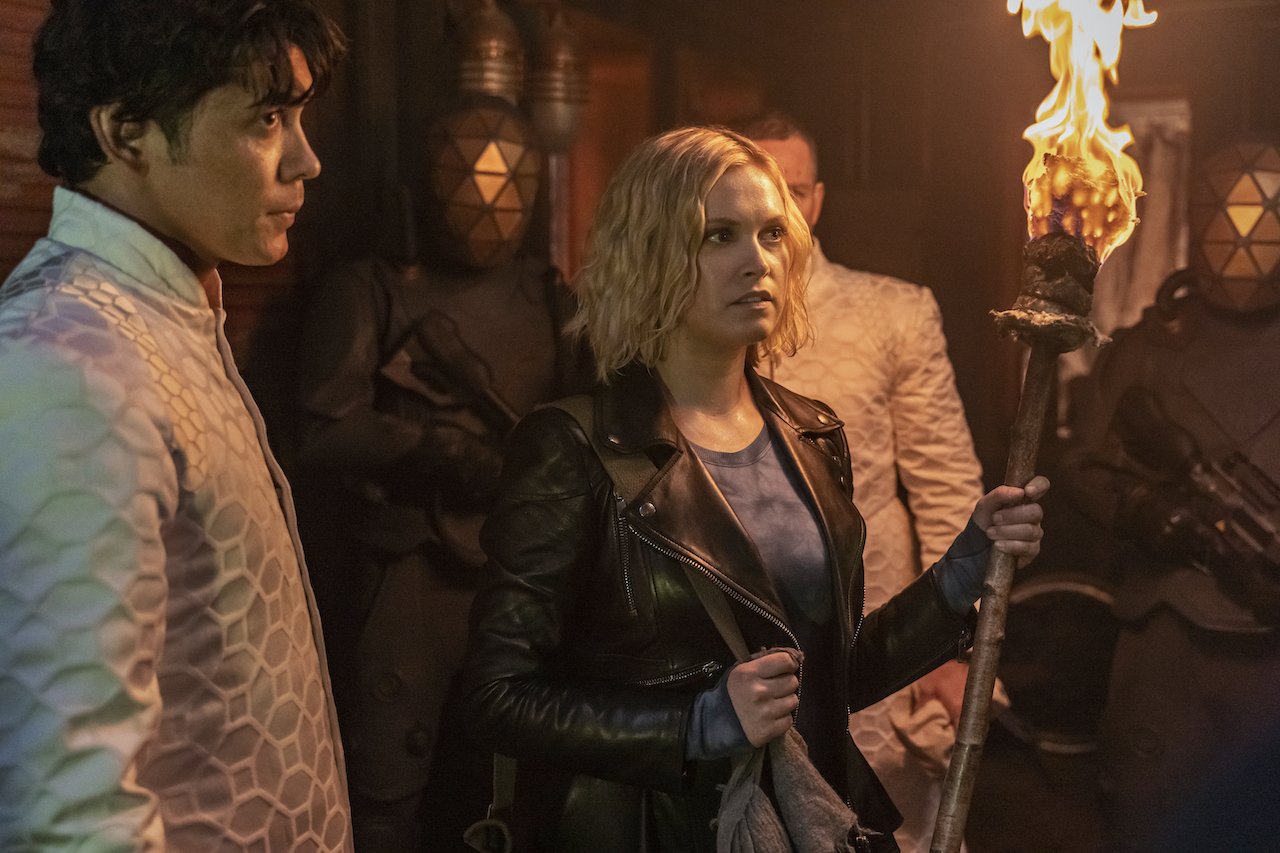
(Colin Bentley/The CW)
And the choice to kill Bellamy. Obviously, that must have been something that you discussed with Bob Morley well in advance?
Yeah. The season was obviously altered hugely at the last minute as we were shooting the first episode when he asked for time off. You want your creative decisions to drive everything and in a perfect world, they would but sometimes outside events play a role as well. You have to roll with it as a showrunner, you have to be creatively nimble enough to adapt on the fly without shutting down. He needed that time and we figured out a way to give it to him.
And what did you take from set?
I have so much stuff from set. I have stuff in storage in my garage. The chess set from the mindspace set that is so massive and it’s kind of creepy, frankly. But it’s one of my favorite props. Looking around my office, I have the flame, I have Clarke’s father’s watch on my desk, I have the bottle that was to be drunk when the people on the Ark go to the ground for the first time that Jaha drinks. I have lots of stuff. [Laughs]
Well, congratulations on seven seasons and getting to end it on your terms. And it really was a beautiful ending…that whole sequence with Picasso and then seeing Murphy there. And the song.
Yeah, yeah. That song, I know that it’s irrelevant actually for the scene itself, but it’s my favorite song of all time. So thank you to U2 for letting us use it!
May we meet again.
Definitely.

